小学六年级英语单元复习
人教PEP版英语六年级上册Unit 1 How can I get there 单元复习-
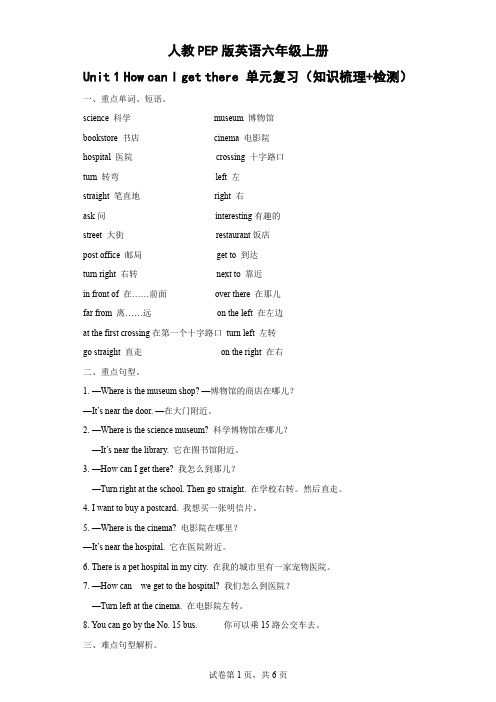
人教PEP版英语六年级上册Unit 1 How can I get there 单元复习(知识梳理+检测)一、重点单词、短语。
science 科学museum 博物馆bookstore 书店cinema 电影院hospital 医院crossing 十字路口turn 转弯left 左straight 笔直地right 右ask问interesting有趣的street 大街restaurant饭店post office 邮局get to 到达turn right 右转next to 靠近in front of 在……前面over there 在那儿far from 离……远on the left 在左边at the first crossing在第一个十字路口turn left 左转go straight 直走on the right 在右二、重点句型。
1. —Where is the museum shop? —博物馆的商店在哪儿?—It’s near the door. —在大门附近。
2. —Where is the science museum? 科学博物馆在哪儿?—It’s near the library. 它在图书馆附近。
3. —How can I get there? 我怎么到那儿?—Turn right at the school. Then go straight. 在学校右转。
然后直走。
4. I want to buy a postcard. 我想买一张明信片。
5. —Where is the cinema? 电影院在哪里?—It’s near the hospital. 它在医院附近。
6. There is a pet hospital in my city. 在我的城市里有一家宠物医院。
7. —How can we get to the hospital? 我们怎么到医院?—Turn left at the cinema. 在电影院左转。
人教PEP小学六年级上册英语一至三单元总复习
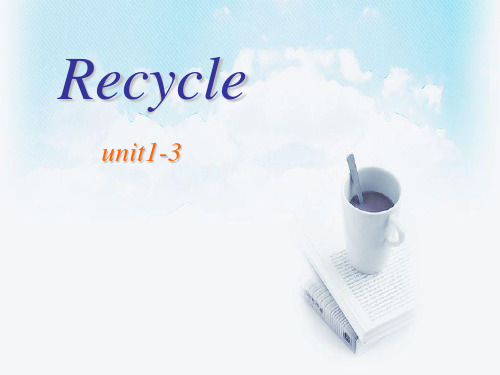
八、读一读,判断正误(10分) There are four people in Mr Black’s family . They’re Mr Black , Mrs. Black , their daughter Amy and their son Sam . Amy has got a bike ,she goes to school by bike . Sam hasn’t got a bike , he goes to school by bus . Mr Black goes to work by car . Mrs. Black is a teacher , and the home is near the school . She goes to work on foot . ( F ) 1. There are five people in the family . ( T ) 2. Amy goes to school by bike . ( F ) 3.Sam goes to school by bike , too . ( F ) 4. Mr Black goes to work by bus . ( F ) 5. Mrs Black isn’t a teacher .
It’s next to the __p_o_s_t_o_ff_i_c_e.
Let’s guess
Where is the__p_o_s_t _o_ff_i_c_e_? It’s next to the __________.
It’s next to the ___s_c_ie_n_c_e__m_u_s_e_u.m
Bye ! Let’s follow the traffic rules!
It’s behind the post office.
新人教版小学英语六年级下册各单元重点考点总结
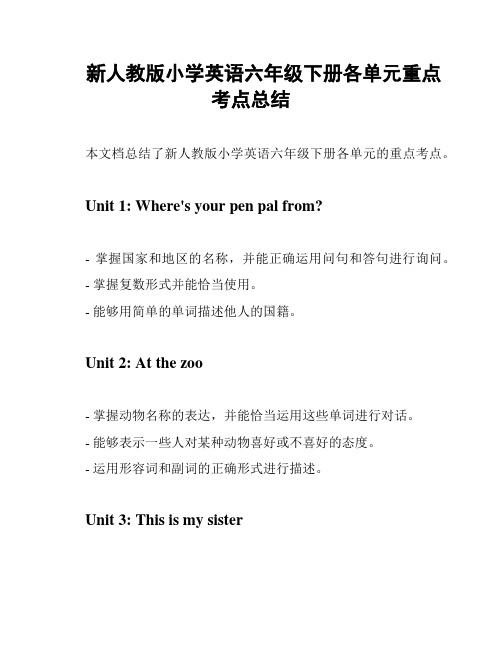
新人教版小学英语六年级下册各单元重点考点总结本文档总结了新人教版小学英语六年级下册各单元的重点考点。
Unit 1: Where's your pen pal from?- 掌握国家和地区的名称,并能正确运用问句和答句进行询问。
- 掌握复数形式并能恰当使用。
- 能够用简单的单词描述他人的国籍。
Unit 2: At the zoo- 掌握动物名称的表达,并能恰当运用这些单词进行对话。
- 能够表示一些人对某种动物喜好或不喜好的态度。
- 运用形容词和副词的正确形式进行描述。
Unit 3: This is my sister- 掌握表示家庭成员关系的词汇,并能在合适的情境下熟练使用。
- 能够用简单的句子表达自己和他人的家庭成员状况。
- 掌握疑问句和肯定/否定回答的语法结构。
Unit 4:What do you usually do on weekend?- 掌握表示日常活动和娱乐爱好的名词和动词,并能在合适的情境下熟练使用。
- 能够描述周末的计划,并能够用适当的时态表达过去、现在和未来的时间。
- 学会以礼貌的方式询问和回答他人的问题。
Unit 5: What's the matter?- 能够描述自己的身体不适,并能运用一些常用的疾病词汇。
- 掌握表示询问、建议和回答的用语,并能在合适的情境下使用。
- 学会表示关心和病愈等祝福的表达方式。
Unit 6: It's raining- 学会用简单的句子描述天气情况,并能表达对不同天气的态度。
- 掌握天气形容词的表达方式。
- 能够描述不同季节的气温、天气和风景。
总之,在学习小学英语六年级下册的过程中,应注重关注以上重点考点,并在实际中多进行运用练习,以此提高英语水平。
小学英语六年级上册人教版第一单元复习
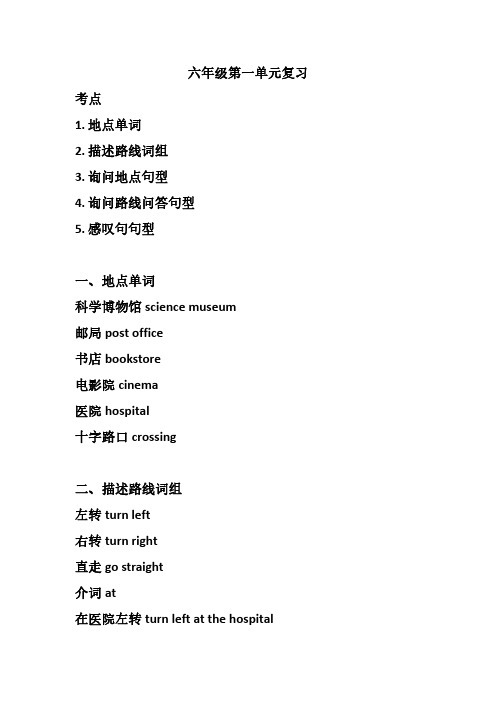
六年级第一单元复习考点1.地点单词2.描述路线词组3.询问地点句型4.询问路线问答句型5.感叹句句型一、地点单词科学博物馆science museum邮局post office书店bookstore电影院cinema医院hospital十字路口crossing二、描述路线词组左转turn left右转turn right直走go straight介词at在医院左转turn left at the hospital在邮局左转turn left at the post office在书店右转turn right at the bookstore在电影院右转turn right at the cinema在十字路口直走go straight at the crossing二、询问地点句型句型问:Where is+地点?答:It's+方位介词+地点.1.医院在哪?在电影院旁边。
Where is the hospital?It’s near the cinema.2.电影院在哪?紧挨着科学博物馆。
Where is the cinema?It’s next to the science museum.3.书店在哪?在邮局的前面。
Where is the bookstore?It’s in front of the post office.三、询问路线句型句型问:How can+主语+get there?How can+主语+get to+地点?答:Turn right/Turn left/go straight+at+地点.1.我们如何到达那儿?How can we get there?2.我如何到达那儿?How can I get there?3.我如何到科学博物馆?How can I get to the science museum?4.我如何到学校?How can I get to school?5.我们如何到达电影院?How can we get to the cinema?6.我们如何到达邮局?How can we get to the post office? 7.我们如何到家?How can we get home?四、感叹句句型句型结构What a/an+形容词+名词!1.多么有趣的电影啊!What an interesting film!2.多么棒的博物馆啊!What a great museum!3.多么漂亮的房间呀!What a nice room!。
六年级英语第一单元复习要点
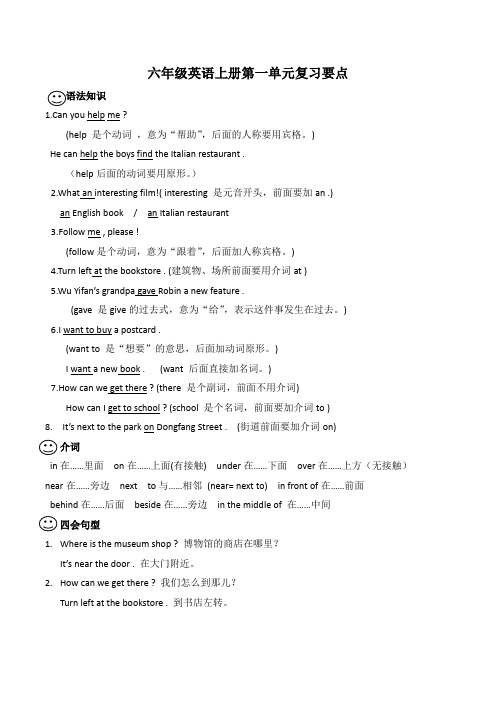
六年级英语上册第一单元复习要点1.Can you help me ?(help 是个动词,意为“帮助”,后面的人称要用宾格。
)He can help the boys find the Italian restaurant .(help后面的动词要用原形。
)2.What an interesting film!( interesting 是元音开头,前面要加an .)an English book / an Italian restaurant3.Follow me , please !(follow是个动词,意为“跟着”,后面加人称宾格。
)4.Turn left at the bookstore . (建筑物、场所前面要用介词at )5.Wu Yifan’s grandpa gave Robin a new feature .(gave 是give的过去式,意为“给”,表示这件事发生在过去。
)6.I want to buy a postcard .(want to 是“想要”的意思,后面加动词原形。
)I want a new book . (want 后面直接加名词。
)7.How can we get there ? (there 是个副词,前面不用介词)How can I get to school ? (school 是个名词,前面要加介词to )8. It’s next to the park on Dongfang Street . (街道前面要加介词on)介词in在……里面on在……上面(有接触) under在……下面over在……上方(无接触)near在……旁边next to与……相邻(near= next to) in front of在……前面behind在……后面beside在……旁边in the middle of 在……中间四会句型1.Where is the museum shop ? 博物馆的商店在哪里?It’s near the door . 在大门附近。
pep六年级英语上册第一单元复习资料
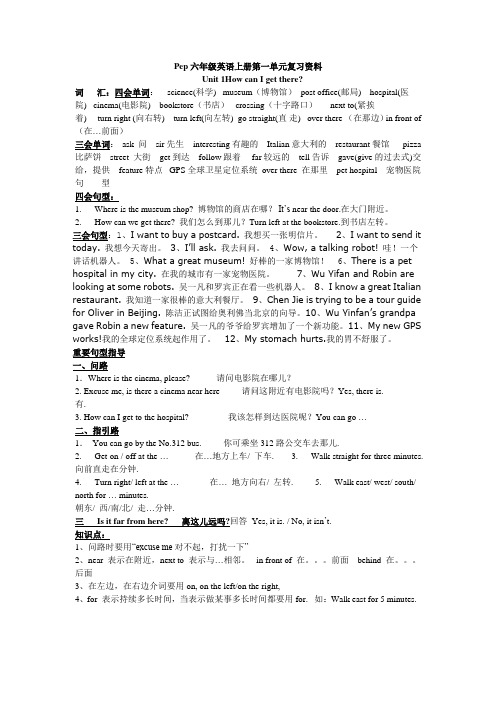
Pep六年级英语上册第一单元复习资料Unit 1How can I get there?词汇:四会单词:science(科学) museum(博物馆)post office(邮局) hospital(医院) cinema(电影院) bookstore(书店)crossing(十字路口) next to(紧挨着) turn right (向右转) turn left(向左转) go straight(直走) over there (在那边)in front of (在…前面)三会单词:ask 问sir先生 interesting有趣的 Italian意大利的 restaurant餐馆 pizza 比萨饼 street 大街get到达 follow跟着 far较远的 tell告诉 gave(give的过去式)交给,提供 feature特点 GPS全球卫星定位系统over there 在那里pet hospital 宠物医院句型四会句型:1. Where is the museum shop? 博物馆的商店在哪?It’s near the door.在大门附近。
2. How can we get there? 我们怎么到那儿?Turn left at the bookstore.到书店左转。
三会句型:1、I want to buy a postcard. 我想买一张明信片。
2、I want to send it today. 我想今天寄出。
3、I’ll ask.我去问问。
4、Wow, a talking robot! 哇!一个讲话机器人。
5、What a great museum! 好棒的一家博物馆! 6、There is a pet hospital in my city. 在我的城市有一家宠物医院。
7、Wu Yifan and Robin are looking at some robots. 吴一凡和罗宾正在看一些机器人。
六年级上册英语重点单词重点句子总复习

PEP六年级上册四会单词及句子复习Unit1第一单元四会单词:Sciencemuseum科学博物馆postoffice邮局bookstore书店cinema电影院hospital医院crossing十字路口turnleft向左转gostraight直走turnright向右转四会句子:1--Whereisthemuseumshop博物馆的商店在哪儿--It`snearthedoor在大门附近2--Howcanwegetthere我们怎么到那儿--Turnleftatthebookstore到书店左转Unit2第二单元四会单词:onfoot走路bybus乘公共汽车bytaxi乘出租车byplane乘飞机bysubway乘地铁byship乘船bytrain乘火车slowdown减速stop停下wait等go走四会句子:1--Howdoyoucometoschool你怎么来学校的--Usually,Icomeonfoot通常我走路来2IntheUSApeopleonbikesmustwearone.在美国骑自行车的人必须戴头盔;3 Don’tgoattheredlight别闯红灯;4Imustpayattentiontothetrafficlights我必须注意交通信号灯Unit3第三单元四会单词:visitmygrandparents拜访我的外祖父母seeafilm看电影takeatrip远行gotothesupermarket去超市dictionary词典comicbook连环画书wordbook单词书postcard明信片四会句子:1--Whatareyougoingtodotomorrow你明天打算做什么--I’mgoingtohaveanartlesson.我要上美术课2 We’regoingtodrawsomepicturesinRenminPark.我要到人民公园去画画3--Whereareyougoing你们打算去哪儿--We`regoingtothecinema我们打算去电影院4Whenareyougoing你们什么时候去Unit4第四单元四会单词:dancing跳舞singing唱歌readingstories看故事书playingfootball踢足球doingkungfu打功夫cooksChinesefood做中国菜studiesChinese学习汉语doeswordpuzzles猜字谜goeshiking远足四会句子:1--WhatarePeter`shobbies彼得有什么爱好--Helikesreadingstories他喜欢读故事2--DoesheliveinSydney他住在悉尼吗--No,hedoesn`t不,他没有3--Doeshelikedoingwordpuzzlesandgoinghiking他喜欢猜字谜和远足吗--Yes,hedoes是的,他喜欢Unit5第五单元四会单词:factoryworker工厂工人postman邮递员businessman生意人policeofficer警察fisherman渔民scientist科学家pilot飞行员coach教练四会句子:1--Whatdoeshedo他是做什么的--Heisabusinessman.他是商人2--Wheredoeshework他在哪儿工作--Heworksatsea.他在海上工作;3--Howdoeshegotowork他怎么上班--Hegoestoworkbybike.他骑自行车上班;Unit6第六单元四会单词:angry生气的afraid害怕的sad悲伤地worried担心的happy开心的seeadoctor看医生domoreexercise做更多的锻炼takeadeepbreath深深吸一口气wearwarmclothes穿暖和的衣服counttoten数到十四会句子:1 They’reafraidofhim.它们害怕它2Thecatisangrywiththem.这只猫生它们的气;3What`swrong怎么了Yourfatherisill.你爸爸生病了;4Heshouldseeadoctorhismorning.他今天早上应该去看病;5Don`tbesad.别伤心PEP六年级上册常用句型问路和指路-Whereis+地点名词……在哪儿-It’s+介词短语.在……;-Howcanwe/Igetto...我们/我怎么到……呢-Turnleft/right./Gostraight./Youcangoby+交通工具.左/右转;直走;/你可以乘坐……去那儿;询问并回答对方来或去某地的交通方式:Howdoyoucome/goto+地点你/你们怎么来/去……I/Wecome/goto+地点+bybike/onfoot….我/我们骑自行车/步行……来/去……询问对方某个时间打算做某事的句型及答语:-Whatareyougoingtodo+表示将来的时间你……打算去做什么-I’mgoingto+动词原形+将来的时间.我打算……去做……询问对方打算去哪儿的句型及答语:Whereareyougoing+表示将来的时间你……打算去哪儿I’mgoingto+表示地点的名词.我打算……去….询问对方打算什么时候去做某事的句型及答语:Whenareyougoing+动词原形你打算什么时候去……Iamgoingto+动词原形+将来时间.我打算……去……;注:begoingto+动词原形=will+动词原形询问别人的爱好并作出回答:Whatis/are某人的hobby/hobbies……有什么爱好=Whatdo/does某人like主语+like/likes+动词-ing+其他.……喜欢做……=某人的hobby is/are….某人的爱好是...;助动词does引导的一般疑问句及答语:Does+第三人称单数主语+动词原形+其他……做……吗-Yes,he/she/itdoes.No,he/she/itdoesn’t.是的,他/她/它是;不,他/她/它不是;询问他人的职业并作出回答:Whatdo/does+主语+do......是做什么的=Whatbe+某人主语+be动词+a/an+职业名词.……是……询问他人的工作地点并作出回答:Wheredo/does+主语+work……在哪儿工作主语+work/works+表示地点的副词或介词短语;……在……工作;询问他人怎么去上班:Howdo/does+主语+gotowork主语+gotowork+bybike/onfoot….询问他人正在做什么及描述正在做某事:What+be+某人+doing主语+be动词+动词-ing+其他….正在…Don’t祈使句:Don’t+动词原形+其他.不要……Don’t+be+形容词+其他.不要……表达对某人或某事的关心:What’wrongwith+某人描述及提问某人的感受的句型:How+do/does某人+feel主语+feel/feels+表示感受的形容词+其他.=主语+be动词+表示感受的形容词+其他.……是……用should来给对方提建议及征求意见的句型:Whatshould某人+do某人should+动词原形.你应该…..语法复习一、现在进行时态3种变化规律1.直接加ing:do—doing draw—drawing cook—cooking answer—answering read—reading listen—listening fly—flying sing—singing play—playing2.去掉末尾的e加ing:write—writing dance—dancing take—taking have—having make—making ride—riding dive—diving3.双写末尾字母加ing:get—getting run—running swim—swimming sit—sitting put—putting你正在干什么WhatareyoudoingI’mansweringthephone.他/她/它正在干什么Whatishe/she/itdoingHe’s/She’s/It’s …他她、它们正在干什么WhataretheydoingTheyare…看到like或likes后面的动词要加上ing二、一般将来时态begoingto/will+动词原形表示一般将来时的时间状语有:thismorning,thisafternoon,thisevening,tomorrow,tonight,thisweekend,ontheweekend,nextweek,nextmonth,nextyear,nextweekend.例:今晚你将要做什么Whatareyougoingtodothisevening—I’mgoingtothecinema.I’mgoingtovisitmygrandparents.你将什么时候去Whenareyougoing—I’mgoingat7:10.你将怎样去呢Howareyougoing—I’mgoingbybus.今天下午你将要去哪里Whereareyougoingthisafternoon—I’mgoingtothebookstore.你将要买什么呢WhatareyougoingtobuyI’mgoingtobuyacomicbook.你将和谁一起去WhoareyougoingwithI’mgoingwithmyparents.三、第三人称单数后面的动词要加s或es1.一般情况加s,如:read—reads;live—lives;play—plays;sing—sings2.动词末尾以s,x,ch,sh或部分以o结尾的加es记住课本中出现的这几个:watches,teaches,goes,does,washes,passes3.辅音字母+y结尾的把y变i再加es,如:fly—flies;study—studies4.特殊情况:have--has5.第三人称单数包括:he;she;it;myfather/friend;Amy/Hangzhou等一个人名或地名;例如:Helikesdrawingpictures.Sheworksinacarcompany.Itcomesfromtheclouds.Myfathergoestoworkonfoot.LiLeioftenplayscomputergamesafterlunch.6.一般疑问句记住:前面助动词加了es,后面动词就不变化了;如:DoessheteachEnglishDoesyourpenpalliveinHangzhou四、不定冠词a和an的用法a用于辅音因素开头的单词前;an用于元音因素开头的单词前;记住课本中出现的要用an的单词:anactor;anactress;anartist;anengineer;anaccountant;anEnglishbook;anorange;anapple;anoldwoman五、动词变化为表示职业或人的单词1.动词后面加er:work—worker;teach—teacher;sing—singer;TV report—TVreporterclean—cleaner2.动词后面加or:act—actor;doctor3.末尾以e结尾的直接加r:write—writer;dance—dancer;drive—driver4.动词后面加ist:art—artist;tour—tourist5.职业男女有区别的:警察policeman—policewoman;演员actor—actress六、8个疑问词which哪一个what什么when什么时候where哪里whose谁的why为什么how怎么样who谁七、人称代词和物主代词I—my-mine我—我的-我的you—your-yours你;你们—你的;你们的-你的;你们的he—his-his他—他的-他的she—her-hers她—她的-她的we—our-ours我们—我们的-我们的they—their-theirs他们/她们/它们—他们的/她们的/它们的他们的/她们的/它们的八、can后面加动词原形WhatcanyoudoIcancookthemeals.Hecanflykites.Shecan playtheviolin.弹小提琴PEP小学英语六年级上册各单元作文一、介绍你和家人上学或上班的方式Igotoschoolonfoot.Mysistergoestoschoolonfoot,too.Mybrothergoestoschoolby bike.Myfathergoestoworkbycar.Mymothergoestoworkbybike.二、看图,说说你怎样去电影院Igotothecinema.Istartfromhere.Gostraightforfiveminutes.Thenturnleftatthe library.Gostraightforoneminute.Thelibraryisontheright.三、读读下周末你和朋友的计划I’mgoingtohaveabusyweekendwithmyfriends.OnSaturdaymorning,wearegoingtog oshpping.OnSaturdayafternoon,wearegoingtothepark.OnSundaymorning,wearego ingtogofishing.OnSundayafternoon,wearegoingtoflykites.Wewillbehappy.四、说说你和你家人的爱好;Ilikeflyingkites.Myfatherlikesdiving.Mymotherlikesplayingthepipa.Mybroth erlikesridingabike.Mysisterlikeslisteningtomusic.MyfriendJohnlikesflying kites.Amylikescollectingstamps.ZhangPenglikesplayingfootball.ChenJielike sridingabike.五、介绍你一家人的职业和上班地点和方式;Myfatherisateacher.Heworksinaschool.Hegoestoworkbycar.Mymotherisanaccoun tant.Sheworksinabank.Shegoestoworkbybus.六、写一封信给你的笔友,介绍你一家人的情况;DearAmy,MynameisSarah.I’m13.I’mtallandthin.Ilikeswimming.Myfatheris40.He’stal landstrong.Helikesreadingbooks.Heisworker.Heworksinafactory.Hegoestowork bycar.M ymotheris39.She’sshortandthin.Shelikescooking.Sheworksinabooksto re.Shegoestoworkonfoot.Yours,Sarah七、看图介绍图中这个人的情况;HeisBen.Heis26.Heisapoliceman.Hegoestowork bybus.Helikesplayingtheviolin.Helikesgoingfishing,too.。
六年级上册英语1-4单元复习

知识点
1、What are you going to do?你想做什么? 询问他人在未来的打算。Be going to 后 面要跟动词的原形。 2、this evening 和 tonight的 区别: this evening指的是今天晚上睡觉以前的时 间,一般指晚上十二点以前。而tonight指的 是今晚,一般是指一整晚的时间,通宵。
主要单词
Stop at a red light 红灯停 Wait at a yellow light 黄灯等 Go at a green light 绿灯行
主要句子
How do you go to school? 你怎么去上学? Usually I go to school on foot. Sometimes I go by bus. 通常我步行去上学。有时候骑自行车去。
知识点
9、近义词: see you---goodbye sure---certainly---of course 10、频度副词: always 总是,一直 often经常 usually 通常 never 从来不 sometimes 有时候
Unit 2 Where is the science museum?
张店东区小学:陈金卓
主要单词:
this morning 今天上午 this afternoon 今天下午 this evening 今天晚上 next week 下周 tomorrow 明天 tonight 今晚 post card 明信片 comic book漫画 书 newspaper报纸
部分疑问代词的意义与用法
人教版PEP六年级英语下册Units 1~2 综合复习 附答案

人教版PEP六年级英语下册Units 1~2 综合复习时间:60分钟满分:100分听力部分(40分)一、听录音,选出你所听到的单词。
听两遍。
(10分)( )1. A. metre B. kilogram C. dinosaur( )2. A. smarter B. stronger C. smaller( )3. A. better B. faster C. thinner( )4. A. cleaned B. clothes C. countryside( )5. A. broken B. enjoy C. hotel二、听录音,选出与你所听内容相符的图片。
听两遍。
(10分)( )1.( )2.( )3.( )4.( )5.三、听录音,选出正确的答语。
听两遍。
(10分)( )1. A. I’m 1.48 metres. B. I’m 48 kilograms.C. I’m 14 years old.( )2. A. Yes, I did. B. No, I don’t. C. Yes, I can. ( )3. A. It is OK. B. It was good. C. They were interesting! ( )4. A. I wear size 35 shoes. B. Tom’s feet are bigger than mine.C. Tom is older than me.( )5. A. He did his homework. B. I cleaned my room.C. She washed her clothes.四、听录音,选出正确的答案。
听两遍。
(10分)( )1. I ________ last Sunday.A. went to the parkB. saw a filmC. went to the zoo ( )2. The ________were very cute. My sister liked them very much.A. monkeysB. elephantsC. pandas ( )3. The elephants were ________ than the giraffes.A. tallerB. shorterC. thinner ( )4. ________ took many pictures of the animals.A. IB. My fatherC. My sister ( )5. We went home at ________ o’clock.A. threeB. fourC. five笔试部分(60分)五、选出下列每组单词中不同类的一项。
(完整版)小学六年级人教版英语总复习及知识点
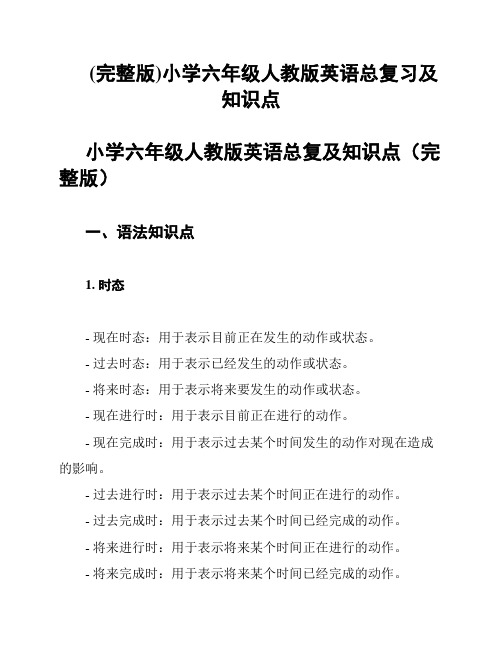
(完整版)小学六年级人教版英语总复习及知识点小学六年级人教版英语总复及知识点(完整版)一、语法知识点1. 时态- 现在时态:用于表示目前正在发生的动作或状态。
- 过去时态:用于表示已经发生的动作或状态。
- 将来时态:用于表示将来要发生的动作或状态。
- 现在进行时:用于表示目前正在进行的动作。
- 现在完成时:用于表示过去某个时间发生的动作对现在造成的影响。
- 过去进行时:用于表示过去某个时间正在进行的动作。
- 过去完成时:用于表示过去某个时间已经完成的动作。
- 将来进行时:用于表示将来某个时间正在进行的动作。
- 将来完成时:用于表示将来某个时间已经完成的动作。
2. 语法结构- 名词:用于表示人、动物、物体、地点等。
- 动词:用于表示动作或状态。
- 形容词:用于描述名词的特征或状态。
- 副词:用于修饰动词、形容词或其他副词。
- 介词:用于表示位置、时间或关系等。
- 代词:用于替代名词。
- 数词:用于表示数量。
- 冠词:用于限定名词的范围。
- 连词:用于连接词语、短语或句子。
3. 句子结构- 主语:句子中执行动作或承受动作的人或事物。
- 谓语:句子中说明主语动作或状态的部分。
- 宾语:句子中接受动作的人或事物。
- 定语:用于修饰名词或代词的成分。
- 状语:用于修饰动词、形容词、副词或整个句子的成分。
- 表语:用于说明主语的状态或特征的部分。
二、总复内容1. 单词- 请根据教材中的单词表,复并牢记相关的单词拼写和意思。
2. 句子- 复教材中的对话和句子,理解并掌握其基本意思和用法。
3. 对话- 复教材中的对话,掌握其中的日常生活用语和表达方式。
4. 语法- 复教材中的语法知识点,加深对时态、语法结构和句子成分的理解。
三、研究方法1. 多听多说- 多听英语教材、歌曲或英语广播,提高听力水平。
- 多说英语,练口语表达和语音准确性。
2. 多读多写- 多读英语教材、故事书等,提高阅读理解能力。
- 多写英语作文,锻炼自己的写作能力和语法运用。
(完整word版)PEP人教版六年级英语上册各单元复习要点
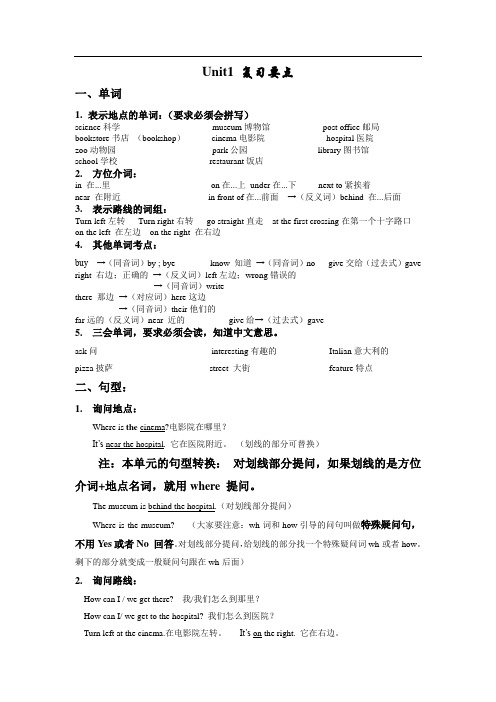
Unit1 复习要点一、单词1.表示地点的单词:(要求必须会拼写)science科学museum博物馆post office邮局bookstore书店(bookshop)cinema电影院hospital医院zoo动物园park公园library图书馆school学校restaurant饭店2.方位介词:in 在...里on在...上under在...下next to紧挨着near 在附近in front of在...前面→(反义词)behind 在...后面3.表示路线的词组:Turn left左转Turn right右转go straight直走at the first crossing在第一个十字路口on the left 在左边on the right 在右边4.其他单词考点:buy →(同音词)by ; bye know 知道→(同音词)no give交给(过去式)gave right 右边;正确的→(反义词)left左边;wrong错误的→(同音词)writethere 那边→(对应词)here这边→(同音词)their他们的far远的(反义词)near 近的give给→(过去式)gave5.三会单词,要求必须会读,知道中文意思。
ask问interesting有趣的Italian意大利的pizza披萨street 大街feature特点二、句型:1.询问地点:Where is the cinema?电影院在哪里?It’s near the hospital. 它在医院附近。
(划线的部分可替换)注:本单元的句型转换:对划线部分提问,如果划线的是方位介词+地点名词,就用where 提问。
The museum is behind the hospital.(对划线部分提问)Where is the museum? (大家要注意:wh-词和how引导的问句叫做特殊疑问句,不用Yes或者No 回答。
小学六年级英语上册4-6单元复习资料

Unit 4 I have a pen pal我喜欢集邮2.(1)----what about you ? 你呢?----Me too. 我也是。
(2)--- Let’s go together. 让我们一起去吧。
(3)---- Can he go with us? 他跟我们去吗?----- Sure!We do morning exercises every day. He usuallly goes to school by bike.A:What does Miss White teach? B:Miss white teaches English.Does Miss White teach English? 肯定回答:Yes,she does . 否认回答:No, she doesn’t .Unit 5 What does she do ?①询问职业●——What does he do ?/What is he ?他是做什么的?——He is a doctor.他是一个医生。
●——What do you do ?/What are you ?你是做什么的?——I ’m a student .我是一个学生。
②询问工作的地点●——Where do you work ?你在哪儿工作?——I work in a school .我在一个学校工作。
●——Where does your mother work ?你妈妈在哪儿工作?——She works in a hospital .她在一个医院工作。
一般疑问句:——Does he work in a company ?他在公司工作吗?——Yes ,he does .是的。
③询问怎样去工作——How does your father go to work ?你父亲怎么去上班?——He goes to work by car .他开车去上班。
Unit 6 The story of rain重要句型:1.A:Where does the rain come from?雨来自于哪儿?B:It comes fromthe cloud. 雨来自于云朵.2.A: How can the water become vapour? B: The sun shines and the waterbecomes vapour.A:Where are you from? 你来自于哪?B:I’m from China.我来自于中国.3.A:Let`s plant a flower. How do you do that? 你怎样做呢? B: First,putthe seed in the soil.4.Would should you do then ? 然后你又该怎样做? Water them. Then put it inthe sun .5.描述事情的先后顺序和过程A: How do you plant a tree?B: First dig the soil. Then put the plant in the soil. Next water it often. Wait for it to grow.。
小学小学六年级英语上册1-3单元重点单词+句子
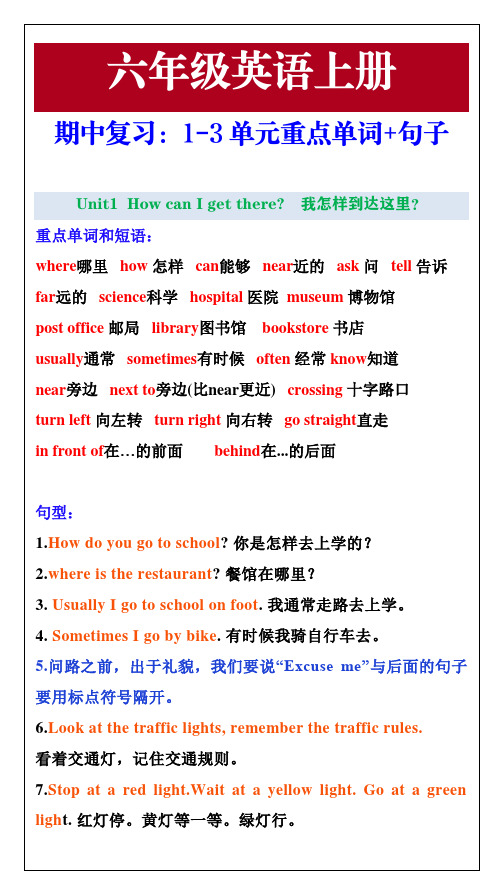
重点单词和短语:
by bike骑自行车by bus坐公车by train坐火车
by plane坐飞机by ship坐轮船by subway坐地铁
by taxi乘出租车on foot= walk走路excuse me打扰一下
please请buy买want to想要a pair of一双get on上车
next week下个星期tomorrow明天tonight今晚busy忙碌的
go home回家post card明信片comic book漫画书
newspaper报纸dictionary字典plant trees种树
句型:
1.---What are you going to do tomorrow?你明天打算做什么?
get off下车turn left左转turn right右转am上午pm下午
now现在look for寻找top停止wait等待get to到达
driver司机must必须
句型:
1.Let's go to the nature park.让我们一起去公园吧!
2.——How do we get there?我们怎样到达这里?
---I'm going to have an art lesson.我要上美术课。
--We are going to draw some pictures in Renmin Park.
我要到人民公园去画画。
2、--Where are you going?你们打算去哪儿?
-- We are going to the cinema.我们打算去电影院。
usually通常sometimes有时候often经常know知道
六年级英语上册知识点复习汇总

六年级英语上册知识点复习汇总(PEP)小学英语总复习六年级上册知识点Unit 1 How can I get there ?一、主要单词:museum博物馆bookstore书店cinema电影院turn 转弯hospital医院left向左post office 邮局science科学right向右straight笔直地 crossing十字路口二、习惯语搭配:post office邮局 science museum科学博物馆pet hospital宠物医院 Italian restaurant意大利餐馆Beihai Park 北海公园Palace Museum故宫博物院go straight直走turn right/left右/左转next to挨着in front of...在...前面near the park在公园附近on Dongfang Street在东方大街上三、惯用表达式:Excuse me 打扰一下 Follow me, please!请跟着我!四、公式化句型:1、问路的句型及其答语:问句:Where is the + 地点?······在哪儿?答语:It's + 表示地点的词语(next to the bookstore, near the hospital/post office, over there,on Dongfang Street, in front of the school... )2、询问怎么到某地的句型及其答语:问句:How can +主语 + get (to)+地点?·····怎么到·····?同义句型: Can you tell me the way to +地点?Where is + 地点? Which is the way to +地点?五、例句:Where is the cinema, please? 请问电影院在哪里?It's next to the hospital. 它与医院相邻。
六年级英语下学期(PEP人教版)全册单元知识点复习资料
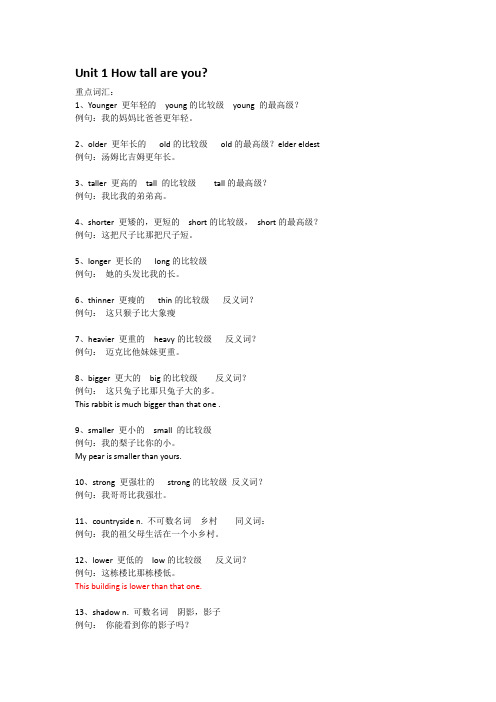
Unit 1 How tall are you?重点词汇:1、Younger 更年轻的young的比较级young 的最高级?例句:我的妈妈比爸爸更年轻。
2、older 更年长的old的比较级old的最高级?elder eldest 例句:汤姆比吉姆更年长。
3、taller 更高的tall 的比较级tall的最高级?例句:我比我的弟弟高。
4、shorter 更矮的,更短的short的比较级,short的最高级?例句:这把尺子比那把尺子短。
5、longer 更长的long的比较级例句:她的头发比我的长。
6、thinner 更瘦的thin的比较级反义词?例句:这只猴子比大象瘦7、heavier 更重的heavy的比较级反义词?例句:迈克比他妹妹更重。
8、bigger 更大的big的比较级反义词?例句:这只兔子比那只兔子大的多。
This rabbit is much bigger than that one .9、smaller 更小的small 的比较级例句:我的梨子比你的小。
My pear is smaller than yours.10、strong 更强壮的strong的比较级反义词?例句:我哥哥比我强壮。
11、countryside n. 不可数名词乡村同义词:例句:我的祖父母生活在一个小乡村。
12、lower 更低的low的比较级反义词?例句:这栋楼比那栋楼低。
This building is lower than that one.13、shadow n. 可数名词阴影,影子例句:你能看到你的影子吗?14、smarter 更聪明的smart的比较级例句:你变得越来越聪明了。
You are getting smarter and smarter.15、become v. 开始变得,变成例句:这个女孩想成为一名演员。
This girl wants to become an actress.重点短语:How tall 多高how heavy 多重how old 多大what size 多大号In this hall 在这个厅里both of 两个都over there 在那边have a look 看一看Go down 下降重点句型:①形容词的最高级:最高级通常用于3人或者3人以上的人或事物之间的比较。
小学六年级英语复习计划5篇1
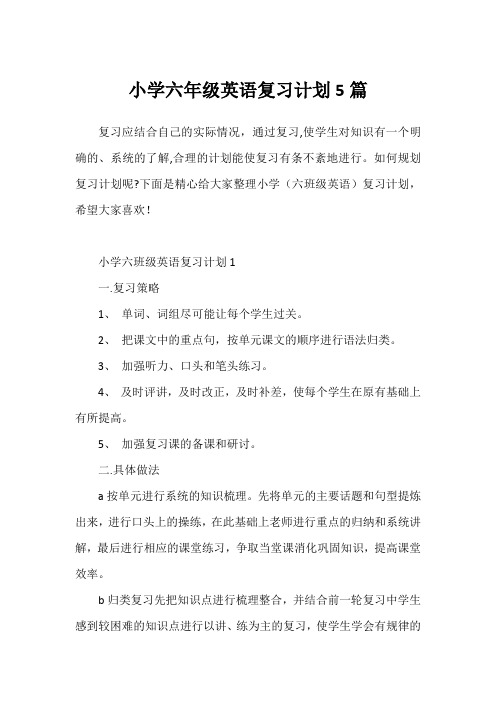
小学六年级英语复习计划5篇复习应结合自己的实际情况,通过复习,使学生对知识有一个明确的、系统的了解,合理的计划能使复习有条不紊地进行。
如何规划复习计划呢?下面是精心给大家整理小学(六班级英语)复习计划,希望大家喜欢!小学六班级英语复习计划1一.复习策略1、单词、词组尽可能让每个学生过关。
2、把课文中的重点句,按单元课文的顺序进行语法归类。
3、加强听力、口头和笔头练习。
4、及时评讲,及时改正,及时补差,使每个学生在原有基础上有所提高。
5、加强复习课的备课和研讨。
二.具体做法a按单元进行系统的知识梳理。
先将单元的主要话题和句型提炼出来,进行口头上的操练,在此基础上老师进行重点的归纳和系统讲解,最后进行相应的课堂练习,争取当堂课消化巩固知识,提高课堂效率。
b归类复习先把知识点进行梳理整合,并结合前一轮复习中学生感到较困难的知识点进行以讲、练为主的复习,使学生学会有规律的学习。
可以从以下几个方面进行归类时态一般现在时,一般过去时和现在进行时进行归纳,比较复习,可以整理信息词和基本的语法结构。
(一)、一般现在时态概念:表示常常发生的或习惯性的动作或目前的状态。
规律:一般用动词原形,当主语为第三人称单数的一般现在时,动词要加s , es , 标志性的单词:always , usually , often , sometimes 如:She usually goes to school on foot(二)、现在进行时态概念:表示说话时正在发生或进行着的动作。
规律:be + 动词ing 形式. 标志性的单词:look , now , listen 如:Look , the boy is playing football .(三)、一般过去时态概念:表示过去某一时刻或某一时间内发生的动作或情况。
标志性的单词:yesterday , last Monday , before , ago, the day before yesterday 规律:1、一般情况动词后面加ed ; 如:worked , cleaned , washed ,2、以不发音e结尾的动词加d就要以了; 如:lived , moved ,loved3、以辅音加y结尾的动词把y改成i再加ed ; 如:study– studied , carry—carried4、重读闭音节的动词要双写末尾的辅音字母再加ed; 如:stop—stopped shop—shopped skip--- skipped 5. 特殊变化:见不规则动词表。
PEP六年级英语下册单元复习计划
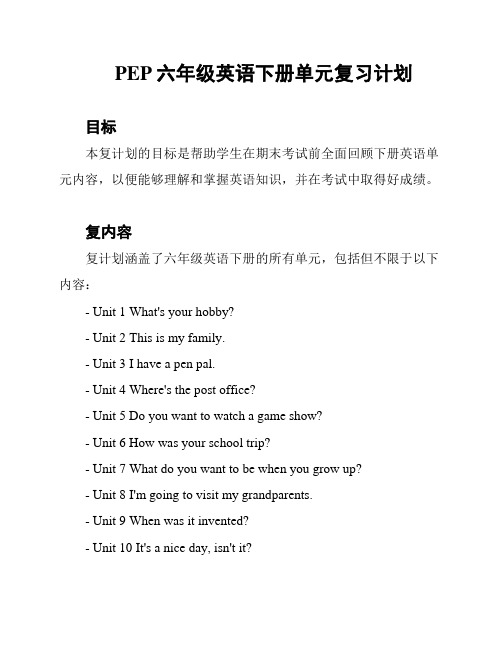
PEP六年级英语下册单元复习计划目标本复计划的目标是帮助学生在期末考试前全面回顾下册英语单元内容,以便能够理解和掌握英语知识,并在考试中取得好成绩。
复内容复计划涵盖了六年级英语下册的所有单元,包括但不限于以下内容:- Unit 1 What's your hobby?- Unit 2 This is my family.- Unit 3 I have a pen pal.- Unit 4 Where's the post office?- Unit 5 Do you want to watch a game show?- Unit 6 How was your school trip?- Unit 7 What do you want to be when you grow up?- Unit 8 I'm going to visit my grandparents.- Unit 9 When was it invented?- Unit 10 It's a nice day, isn't it?计划安排本复计划为期10天,每天复一个单元的内容。
每天的研究安排如下:1. 阅读课本中该单元的重点内容,理解词汇和语法知识。
2. 完成课本中的练题和答案解析。
3. 做老师布置的该单元作业,以便能够深入理解和掌握知识点。
4. 口头或书面回顾课本中的其他例句或练题,巩固知识点。
注意事项- 每天的研究时间不超过两个小时,以避免疲劳。
- 如果在研究中遇到问题,请及时向老师请教,以便更好地理解知识点。
- 研究过程中请做好笔记,便于日后回顾和总结。
- 考试前请复所有单元的知识点,并做好复记录,以便做到心中有数。
祝愿大家能够掌握英语知识,取得好成绩!。
小学人教版六年级英语上册复习要点

小学人教版六年级英语上(Shang)册复习要点Unit1 How can I get there?一(Yi)、重点单词:地(Di)点:science museum科学(Xue)博物馆 post office 邮局 bookstore 书店cinema 电影院 hospital 医院动(Dong)作:go straight 直(Zhi)走 turn left/right 左转、右转方(Fang)位: in front of :在(Zai)···前面 behind 在···后面near在…旁边 next to 紧挨着 beside 在旁边over 在…上方 on the left 在左边 on the right 在右边二、重点句型:(1)Is / Are there…?某处有某物吗?肯定回答:Yes, there is/are. 否定回答:No, there isn’t/aren’t.(2)Where is the + 地点? ... ... 在哪里?It’s + 表示地点的名词. 它... ...例句:Where is the cinema? 电影院在哪?It’s next to the bookstore. 在书店的旁边。
(3)How can + 主语+get(to)+ 地点? ... ...怎么到... ...?(如果get后面接的词为副词,则要省略介词to.)例句:How can we get to the park?How can we get there? 我们怎么到那儿?同义句型:Can you tell me the way to + 地点?( 4 )Where is + 地点? Which is the way to + 地点?( 5 ) Turn left at the bookstore. 到书店左转。
Unit 2 Ways to go to school?一、重点单词/短语:交通方式:by bike /bus /plane /subway /train /ship /taxi /ferry骑自行车/乘公共汽车/飞机/地铁/火车/船/出租汽车/轮渡take the No.57 bus 乘57路公共汽车on foot 步行其他:slow down慢下来 pay attention to 注意 traffic lights 交通信号灯 look right 向右看 cross the road 横穿马路 at home 在家二、重点句型:(1)How do you + 地点?你们怎么来... 的?I usually/ often/sometimes .. ... 我通常/经常/有时...How do you go(to) + 地点?你们怎么去...的?How do you get (to) + 地点?你们怎(Zen)么到达...的?(频度副词:频度副词又称频率副词,用来表示事情发(Fa)生的频率,即某事多主语 + must + 动词原(Yuan)形 + (其它)(must和(He)can, should一样都是情态动(Dong)词,must意(Yi)思是“必(Bi)须”,语气很强烈,没有人称和数的变化,后面接动词原形。
六年级英语复习教案七篇
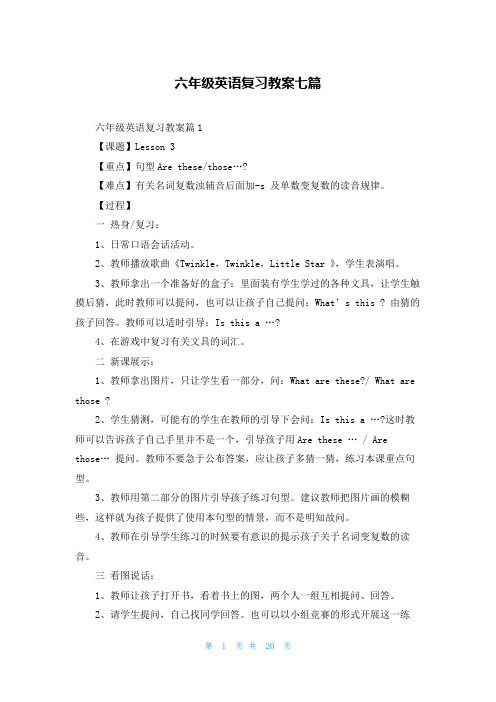
六年级英语复习教案七篇六年级英语复习教案篇1【课题】Lesson 3【重点】句型Are these/those…?【难点】有关名词复数浊辅音后面加-s 及单数变复数的读音规律。
【过程】一热身/复习:1、日常口语会话活动。
2、教师播放歌曲《Twinkle,Twinkle,Little Star 》,学生表演唱。
3、教师拿出一个准备好的盒子:里面装有学生学过的各种文具,让学生触摸后猜,此时教师可以提问,也可以让孩子自己提问:What’s this ? 由猜的孩子回答。
教师可以适时引导:Is this a …?4、在游戏中复习有关文具的词汇。
二新课展示:1、教师拿出图片,只让学生看一部分,问:What are these?/ What are those ?2、学生猜测,可能有的学生在教师的引导下会问:Is this a …?这时教师可以告诉孩子自己手里并不是一个,引导孩子用Are these … / Are those… 提问。
教师不要急于公布答案,应让孩子多猜一猜,练习本课重点句型。
3、教师用第二部分的图片引导孩子练习句型。
建议教师把图片画的模糊些,这样就为孩子提供了使用本句型的情景,而不是明知故问。
4、教师在引导学生练习的时候要有意识的提示孩子关于名词变复数的读音。
三看图说话:1、教师让孩子打开书,看着书上的图,两个人一组互相提问、回答。
2、请学生提问,自己找同学回答。
也可以以小组竞赛的形式开展这一练习。
3、教师出示词语卡片:map + s = maps [ maps ]请学生读。
4、再出示:pig + s = [ pig ]请学生填。
此时教师可以引导孩子回忆、讨论,然后再回答。
教师带读单词:dogs pigs eggs bags flags cups 四学习课文:1、教师请一位同学到前面来按要求画简笔画。
教师准备一张小纸条,上面写着tree。
学生画tree。
教师问大家:What is this ?再找两位同学同样画树,教师再问:What are these?Are these trees?2、下面由教师画,同时提要求:我在画的时候你们可以随时用英语提问。
- 1、下载文档前请自行甄别文档内容的完整性,平台不提供额外的编辑、内容补充、找答案等附加服务。
- 2、"仅部分预览"的文档,不可在线预览部分如存在完整性等问题,可反馈申请退款(可完整预览的文档不适用该条件!)。
- 3、如文档侵犯您的权益,请联系客服反馈,我们会尽快为您处理(人工客服工作时间:9:00-18:30)。
小学六年级英语单元复习(答题时间:60分钟)一. 听音辨词:1. A. autumn B. aunt C. waiter D. play2. A. breath B. great C. bread D. cheap3. A. hear B. learn C. bear D. heart4. A. cloudy B. group C. touch D. would5. A. food B. boot C. moon D. good二. 句子理解:从下列各组句子中选出与你听到的句子意思相同或相近的选项。
1. A. Jim works very hard in his class.B. Everyone in Jim’s class is quite tall.C. Jim is the tallest student in his class.D. Jim is taller than Tom.2. A. It’s a good idea.B. I don’t know.C. I think so.D. It doesn’t matter.3. A. I am a doctor.B. I am a teacher.C. I am a businessman.D. I am a polit.4. A. What’s this ?B. what about you ?C. What’s the weather like today?D. What’s wrong?5. A. Look for the snakes.B. Take care of snakes.C. Look out of the window.D. The snakes are dangerous.三. 对话理解:你将听到一段对话和一个问题,选出能回答所提问题的选项。
1. A. 10:50 B. 11;00 C. 11:10 D. 11:112. A. Tom’s B. Mary’s C. Jim’s D. father’s3. A. To the zoo B. To school C. To home D. To the party4. A. Oranges B. Cakes C. Bananas D. Apples5. A. Dec.20 B. Dec.21 C. Dec.22 D. Dec.23四. 根据所听短文内容,补全下列句子。
1. Mrs.Green is ____________________________.2. Alone means ____________________(可用汉语回答)3. She has no ________________ or __________________.4. Mrs. Green is _______ years old.5. Jim is in Class ______________.Writing一. 选择填空:1. School begins ___ September.A. inB. onC.atD. under2. We work five days a week,____ Monday ____ Friday.A. on, onB. at, toC. from, toD. to, to3. July comes _____ June.A. beforeB. afterC. withD. above4. They go to school ____ school bus.A. byB. onC. atD. in5. An apple tree is in front of the house. The house is ____ the apple tree.A. beforeB. behindC. besideD. in front of6. Where ____ you this morning? I didn’t see you.A. areB. isC. wereD. was7. ---What ___ you going to do tomorrow?--- I _______ going to visit my uncle.A. are, areB. are, amC. were, wasD. is, am8. Is she his aunt?Yes_______.A. he isB. I amC. she is9. Who’s the woman?_____ my grandma.A you’re B. He’s C. She’s10. You are ill now. You must _______ .A. have a lookB. have a goC. have a restD. have a swim11. --- Can you ride a bike ?---- No, I____A. may notB. can’tC. needn’tD. mustn’t12. You’d better ____ on the road. It’s dangerous.A. not to playB. not playC. to not playD. don’t play13.--- _______ does she have breakfast?-----She has breakfast at 6:30A. HowB. What timeC. What aboutD. Which one14. --- Is it time _____ to school now?----- Oh, yes. Let’s go.A. forB. to goC. getD. to leave15. Here are your school clothes. Please ______.A. put them onB. put on themC. put it onD. put on it二. 完型填空:Mrs.Smith’s grandfather lives __1____ her. Every morning he goes for a walk in the park and comes home __2__ noon for his lunch.But one morning __ 3__ police car stopped outside her house at twelve o’clock, and two __4__ helped the old man get out. One of them said to Mrs. Smith, your grandfather __5__ his way in the park and phoned us for help. Mrs. Smith was very surprised.__6__ the two policemen left, she asked: “Grandpa, you go to that park everyday. How did you lose your way in there? ”The old man smiled and said, “I __7__ tired, I didn’t want to __8__ home.”()1.A.and B. with C./ D. after()2.A. on B. at C. in D.after()3. A.an B.a C. the D. that()4.A. policemen B. policemans C. policeman D.policemens()5. A.lose B. forget C.lost D,miss()6.A. When B. Before C. After D. On()7.A. am B.was C.were D.are()8.A. walked B.walk C. go D.went三. 阅读短文,根据短文内容判断正误。
Simma lives in the forest. He is five years old,. In the forest, there are many animals: rabbits, monkeys and tigers. One day, Simma was hungry. “I’m hungry! I want food!” he shouted.A littl e white rabbit came. “ Simma, eat this carrot,” She said. “ You will not be hungry.”“No! No! ” Simma shouted. “ Go away,” he got angry. “ Only rabbits like carrots. I’m hungry! I want food!” he shouted loudly.A brown monkey came. He gave Simma a fruit, but Simma threw it away. He shouted : “ I’m hungry! I want food!”He walked and walked. Then Mrs.Simma came. “ Simma, come and eat this meat,” she said. “you will not be hungry.”“Yes! Yes!” said Simma. “I will eat this meat. Lions like meat. I will eat this meat.”Simma and Mrs.Simma ate the meat. Simma was happy. And Mrs.Simma was happy. All the animals were happy.1. Simma is 5.2. There are many pandas.3. The rabbit is white.4. The monkey gave Simma a fruit.5. Simma likes the fruit.6. Simma’s fav orite food is meat.【试题答案】Listening一. 听音辨词:B 1. A. autumn B. aunt C. waiter D. playC 2. A. breath B. great C. bread D. cheapA 3. A. hear B. learn C. bear D. heartC 4. A. cloudy B. group C. touch D. wouldB 5. A. food B. boot C. moon D. good二. 句子理解:从下列各组句子中选出与你听到的句子意思相同或相近的选项。
